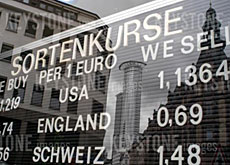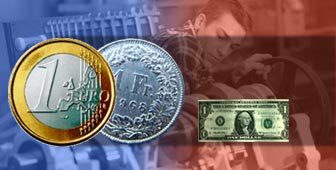Central bank downplays sliding dollar

The Swiss National Bank reiterated on Wednesday that it was ready to act aggressively to counter any sharp rise in the value of the franc.
The franc has risen to its highest level in seven years against the dollar, increasing the pressure on Switzerland’s export-dependent economy.
“The Swiss National Bank has demonstrated several times in recent months that it does not hesitate to take decisive policy measures in such a case,” said Ulrich Kohli, the bank’s chief economist.
“It is true that our interest rates are extremely low at the moment, but even if there is little scope for further cuts there are other instruments at our disposal that we can use if necessary.”
The dollar has plunged below SFr1.30, fuelling fears that Switzerland’s already weak export sector will take a tumble.
But Kohli said the dollar’s drop in value had been orderly and had not caused severe turbulence in the foreign exchange markets.
He also dismissed fears of deflation in Switzerland, insisting that the economy was poised to rebound as the year wore on.
Kohli added that the Swiss National Bank (SNB) was happy that the war in Iraq had not driven the franc higher against the euro, the currency of Switzerland’s main trading partners.
“On the contrary, our currency has weakened significantly against the euro in the past two months,” he said.
The euro’s value has climbed back above 1.50 francs, a level that many exporters and tourist industries consider the pain threshhold.
Exports threatened
The franc’s recent performance, added Kohli, appeared to show that its traditional role as a safe haven in times of crisis had waned.
“The franc seems to have lost some of its safe-haven lustre, which will not lead us to shed any tears.”
But other experts are warning that a prolonged fall in the value of the dollar could hit Swiss industry hard at a time when orders in the machinery sector – the country’s biggest exporter – are picking up. In the first quarter, orders were up 8.4 per cent compared with a year ago.
After Germany, the US is the second most important export market for Swiss products.
Swiss exports to the US totalled SFr14 billion ($8.3 billion)in 2001, some ten per cent of total exports.
Fears of more pain for exporters came after hints at the weekend by US Treasury Secretary John Snow that Washington had abandoned its “strong” dollar policy.
His remarks at a meeting of G-8 finance officials in France suggested that Washington would not intervene to support its flagging currency.
Delayed reaction
Stefan Eitenmüller, head of forecasting at independent think-tank Basel Economics, says Swiss exporters could feel the pinch by late this year.
“If [the dollar] continues or goes lower we would certainly see effects in export performance later in 2003 and 2004,” he told swissinfo.
The reason for the delay is that exporters usually hedge their currency exposure, so they would not be visibly affected in the short-term.
Eitenmüller says a weak dollar will hammer exporters’ margins – rather than the actual level of exports – because the price fetched for Swiss goods will be reduced.
“It’s the opposite of the direction we’ve seen in the past. Then the increase in the dollar boosted the profit margins of the exporters. Now it’s the downside of the same coin,” he said.
However, Kohli believes the US economy is poised to recover, which will, in turn boost the European market.
But he warned that unemployment will continue to increase for the foreseeable future.
Worst over?
Eitenmüller said a cut in interest rates by the Swiss National Bank – in an effort to drive down the value of the franc – was unlikely because rates are already very low.
“A decline in interest rates would not have a substantial effect, if the markets believe the dollar should be lower,” he added.
The Swiss National Bank has already slashed rates to nearly zero and now wants to keep benchmark three-month interest rates at around 0.25 per cent.
However, Swiss firms are far more interested in the fortunes of the European Union, which absorbs 60 per cent of the country’s exports.
Eitenmüller says they hope a low dollar will boost business, or at least margins, in trade with the EU.
“Switzerland exports a higher share into the euro area than in dollar-denominated terms,” he said.
“As long as the increase in the euro against the dollar is stronger than the appreciation of the franc, this would [help to] offset the decline in the dollar,” he said.
swissinfo, Elvira Wiegers (translated by Faryal Mirza)
The US dollar has reached a seven-year low against the Swiss franc, trading below SFr1.30 on Thursday.
The euro was changing hands at SFr1.51 on Thursday.
More than 50 per cent of corporate earnings come from the export industry.
Ten per cent of Swiss exports go to the US.

In compliance with the JTI standards
More: SWI swissinfo.ch certified by the Journalism Trust Initiative


You can find an overview of ongoing debates with our journalists here. Please join us!
If you want to start a conversation about a topic raised in this article or want to report factual errors, email us at english@swissinfo.ch.